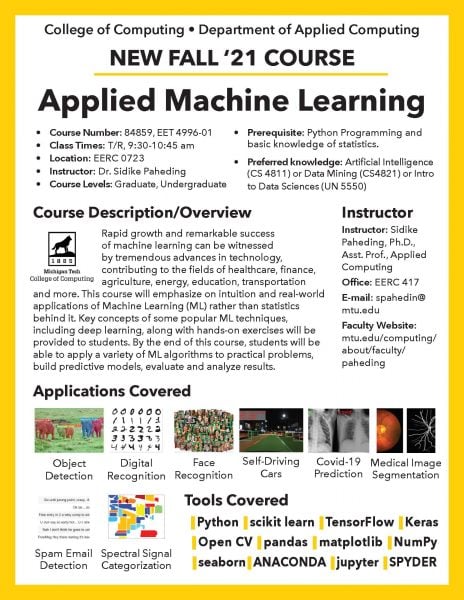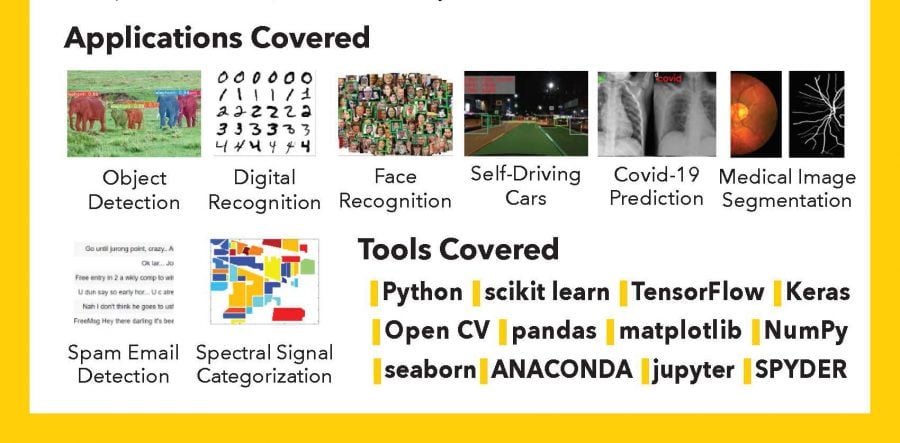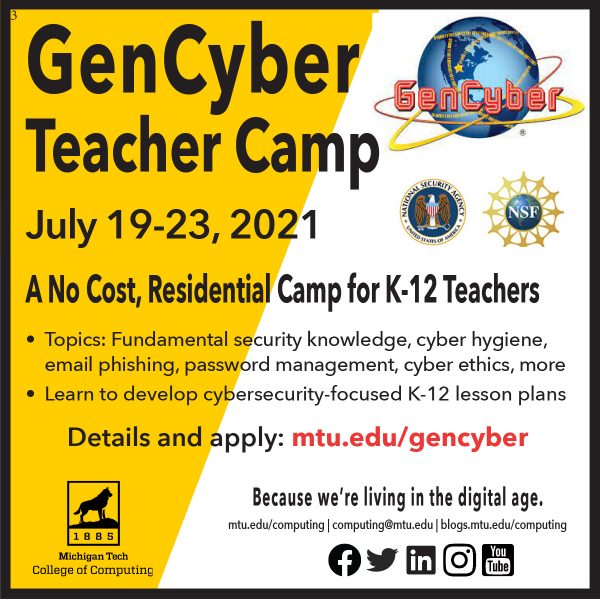by Office of Innovation and Commercialization
For several years, Michigan Tech has partnered with the State of Michigan and other stakeholders to create an entrepreneurial and innovation ecosystem. Members of the community at large can participate in this process at an event on the Michigan Tech campus.
Michigan Tech hosts one of five hubs that make up the Michigan Translational and Research Commercialization (MTRAC), funded by the state’s Michigan 21st Century Jobs fund through the Michigan Strategic Fund. MTRAC-supported projects have secured more than $315 million in follow-on funding.
Join us at noon on September 10, 2021 in GLRC 202 to hear directly from the program directors of each hub to learn about program requirements and what makes for a competitive proposal. Directors will have a few appointments on a first come, first serve availability following the seminar for one-on-one meetings with prospective principal investigators.
MTRAC provides matching funds for researchers to accelerate the transfer of new technologies from universities, hospital systems, and nonprofit research centers into the commercial market. Funding is available under any of the five statewide hub programs organized around the following technology areas:
- Ag Bio Innovation Hub (managed by Michigan State University)
- Life Sciences Innovation Hub (managed by the University of Michigan)
- Advanced Transportation Innovation Hub (managed by University of Michigan)
- Advanced Materials Innovation Hub (managed by Michigan Tech)
- Advanced Computing Innovation Hub (managed by Wayne State University)
Prospective entrepreneurs will learn about moving technology from lab to market. Program objectives, goals and scope will be discussed by representatives from the five MTRAC hubs and representatives from the Michigan Economic Development Corporation (MEDC).
August 2-6, 2021. PinT 2021 will be offered in a virtual-format.
Register online on the Registration Page.
Computer models and simulations play a central role in the study of complex systems in engineering, life sciences, medicine, chemistry, and physics. Utilizing modern supercomputers to run models and simulations allows for experimentation in virtual laboratories, thus saving both time and resources. Although the next generation of supercomputers will contain an unprecedented number of processors, this will not automatically increase the speed of running simulations. New mathematical algorithms are needed that can fully harness the processing potential of these new systems. Parallel-in-time methods, the subject of this workshop, are timely and necessary, as they extend existing computer models to these next generation machines by adding a new dimension of scalability. Thus, the use of parallel-in-time methods will provide dramatically faster simulations in many important areas, such as biomedical applications (e.g., heart modeling), computational fluid dynamics (e.g., aerodynamics and weather prediction), and machine learning. Computational and applied mathematics plays a foundational role in this projected advancement.
The primary focus of the proposed parallel-in-time workshop is to disseminate cutting-edge research and facilitate scientific discussions on the field of parallel time integration methods. This workshop aligns with the National Strategic Computing Initiative (NSCI) objective: “increase coherence between technology for modeling/simulation and data analytics”. The need for parallel time integration is being driven by microprocessor trends, where future speedups for computational simulations will come through using increasing numbers of cores and not through faster clock speeds. Thus as spatial parallelism techniques saturate, parallelization in the time direction offers the best avenue for leveraging next generation supercomputers with billions of processors. Regarding the mathematical treatment of parallel time integrators, one must use advanced methodologies from the theory of partial differential equations in a functional analytic setting, numerical discretization and integration, convergence analyses of iterative methods, and the development and implementation of new parallel algorithms. Thus, the workshop will bring together an interdisciplinary group of experts spanning these areas.

The 2021 EAI International Conference on Applied Cryptography in Computer and Communications (AC3 2021) takes place May 15-16, 2021.
Dr. Bo Chen, Computer Science, founding general chair of the new EAI conference, says the conference has brought together researchers, developers and practitioners from around the world who will focus on, discuss, and explore the area of applied cryptography in computer and communication systems.
Conference Topics
Conference topics include all aspects of applied cryptography, including symmetric cryptography, public-key cryptography, cryptographic protocols, cryptographic implementations, cryptographic standards and practices, as well as using cryptography to solve real-world problems.
Technical Program
The AC3 2021 technical program includes four main conference tracks at which 11 papers will be presented virtually in oral presentations.
- Track 1 – Blockchain
- Track 2 – Authentication
- Track 3 – Secure Computation
- 4 – Practical Crypto Application. Aside from the high-quality technical paper presentations, the technical program also features two keynote speeches, and one technical workshop.
Keynotes
The two keynote speeches will be delivered by Prof. Kui Ren (ACM Fellow, IEEE Fellow), Zhejiang University, China; and IEEE Fellow Prof. Robert Deng, Singapore Management University.
Workshop
A workshop, the First International Workshop on Security for Internet of Things (IOTS 2021), includes four technical papers which aim to develop cryptographic techniques for ensuring the IoT security. The conference, originally planned to be held in Xiamen China, was moved it online for the health and safety of participants.
Register to participate in the virtual conference here. Use the “Sign up for free access to the livestream” option.
European Alliance for Innovation (EAI) is an international professional community and a nonprofit organization. The goal of EAI is to empower the global ICT research and innovation community, and to promote cooperation between European and International ICT communities.
EAI Conferences span the globe with opportunities to meet, explore, and contribute to the world of ICT research. With 100+ annual events (including MobiQuitous, SecureComm, etc.), EAI is one of the world’s most prolific scientific communities.
EAI Conferences are published via Springer’s LNICST and EAI’s EUDL, and they are indexed in all leading indexing services, including EI, ISI, Scopus, CrossRef, Google Scholar, dblp, MAS, EBSCO, Microsoft Academic Search, CiteSeerX, and more.

Summary
- Course Number: 84859, EET 4996-01
- Class Times: T/R, 9:30-10:45 am
- Location: EERC 0723
- Instructor: Dr. Sidike Paheding
- Course Levels: Graduate, Undergraduate
- Prerequisite: Python Programming and basic knowledge of statistics.
- Preferred knowledge: Artificial Intelligence (CS 4811) or Data Mining (CS4821) or Intro to Data Sciences (UN 5550)
Course Description/Overview
Rapid growth and remarkable success of machine learning can be witnessed by tremendous advances in technology, contributing to the fields of healthcare, finance, agriculture, energy, education, transportation and more. This course will emphasize on intuition and real-world applications of Machine Learning (ML) rather than statistics behind it. Key concepts of some popular ML techniques, including deep learning, along with hands-on exercises will be provided to students. By the end of this course, students will be able to apply a variety of ML algorithms to practical
Applications Covered
- Object Detection
- Digital Recognition
- Face Recognition
- Self-Driving Cars
- Medical Image Segmentation
- Covid-19 Prediction
- Spam Email Detection
- Spectral Signal Categorization
Tools Covered
- Python
- scikit learn
- TensorFlow
- Keras
- Open CV
- pandas
- matplotlib
- NumPy
- seaborn
- ANACONDA
- jupyter
- SPYDER
Download the course description flyer:


An NSA/NSF GenCyber Cybersecurity Teacher Camp for K-12 teachers will take place at Michigan Tech the week of July 19 – 23, 2021. This residential camp is offered at no cost to all participants.
Topics include fundamental security knowledge, cyber hygiene, and other topics such as email phishing, password management, and cyber ethics. Participants will also learn how to develop lesson plans to teach cybersecurity in K-12.
Room and board are included. Each teacher participant will receive a stipend of $500 for attending and completing camp activities. Commuting is also possible. Camp activities will count for 25 State Continuing Education Clock Hours (SCECH).
Find complete details and apply here. The application deadline is May 1, 2021.
Funding of the camp is provided jointly by the National Security Agency (NSA) and the National Science Foundation (NSF) through a grant award led by Professor Yu Cai and Tim Van Wagner, both from the College of Computing Department of Applied Computing.
Watch a video from the 2019 GenCyber Teacher Camp below.
by Major Daniel F. Gwosch, Professor of Military Science
Are you interested in a DoD career in Cyber Security after Michigan Tech? Join the Arctic Warrior Cadets and learn about DoD Cyber from a panel of subject matter experts. The presentation will be held at 1 p.m. tomorrow (April 9).
Presenting are:
- Colonel Silas Calhoun (US Army, Cyber)
- 1LT Lisa Hozey (Army Reserve, Cyber)
- CPT Scott Ardis (Army Reserve, Cyber)
- Capt. Chris Jamison (USAF, Cyber)
This event will be a virtual event and is intended to provide information on current Cyber activities being conducted by US Army Cyber and the Joint DoD community of experts
by Office of the Vice President for Research
Join us at noon today (April 8) for a special session of the VPR Research Series as we “Meet MTRI.”
This event will introduce the team at the Michigan Tech Research Institute and explore opportunities for others in our research community to collaborate with them.